Ole Blue Eyes does
agility his way
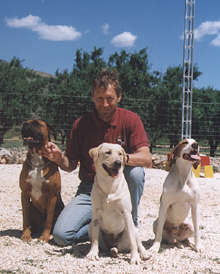 In
what he calls his 'previous' life,' Belgian Bruno Goffin had been a very busy business man
indeed. He even owned a furniture store in the UK. Seven years ago he left his country and went
to Spain where he and his wife started and now manage a dog-friendly B&B. There he also set up
a dog training club because he wanted to show his Spanish neighbours that you can do something
else with a dog other than chain it up in a cage. Today he has members from eight different
countries, and is known as Bruno de los Perros (translation: Bruno the Dogman.) In
what he calls his 'previous' life,' Belgian Bruno Goffin had been a very busy business man
indeed. He even owned a furniture store in the UK. Seven years ago he left his country and went
to Spain where he and his wife started and now manage a dog-friendly B&B. There he also set up
a dog training club because he wanted to show his Spanish neighbours that you can do something
else with a dog other than chain it up in a cage. Today he has members from eight different
countries, and is known as Bruno de los Perros (translation: Bruno the Dogman.)
Our lives changed when my wife decided to get a dog. At
that time, we didn't know a thing about dogs, so the first thing we did was buy a book about
different breeds. Taking into account the characteristics of every breed, we finally opted for
a Labrador bitch. Since then, our life has been much more beautiful than before.
We took it upon us never to go on holidays without the
dog and only to fly separately. We also went to a dog training club called La Ponderosa because
we wanted to learn everything about these wonderful creatures. Not only did they teach
obedience, but they had - and still have - a very good agility team.
Becoming an instructor
A couple of months later, one of trainers left the club and I told
the president that I was prepared to help. BTW you should know that I was trained to be
a teacher. I started as an assistant, helping the trainer of the puppy classes. One year later
the president told me that the club would pay the fee if I took the official trainers course -
which I did.
That is when my career as a trainer really started.
Afterwards I decided to become a member in a second dog training club, where I could go to the
classes as a pupil, because I wanted to keep on training my own dog.
Change of direction
Two years later I was offered a job in Spain, and we moved to Calpe.
Life there was quite a change. I had lived in London (Hampstead and Highgate) in the Eighties,
when I had a 20,000 sq. feet furniture store on the North Circular Road 950, very close to
Staples Corner. I loved going to the theatre, the beautiful country hotels and the enormous
turnover in the store. (I also loved the price I got for it when I sold it.) After I sold the
furniture store in London, I had opened nine textile shops in Belgium and Holland... and sold
them. Then I started a car rental company, opened 16 branches and sold that also. But I
digress...
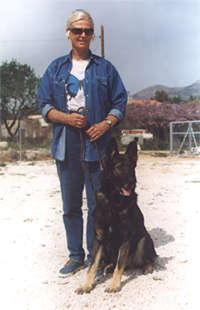 English
speakers only! English
speakers only!
I found a small English dog training club in nearby Pedreguer, a town
about a half an hour by car, where people trained in the 100 square metre garden of an elderly
English lady. It was not long until I had became a trainer there.
Soon I discovered that dog owners of other nationalities
were not welcome if they did not speak English. This came as quite a shock to me. For my
parents, for wife and myself, our children and grandchildren, learning another language is a
refreshing and vitalizing opportunity. We have always tried to - and we still try - to learn as
many foreign languages as possible.
I could not understand how my English friends could live
in a foreign country between 10 to 20 years and still not be able to talk to their Spanish
neighbours. More so because, according to me, there was a lot of work to be done with Spanish
dog owners.
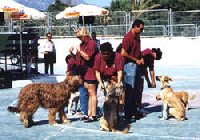 Club
Canino Las Cutas Club
Canino Las Cutas
That is why I took the decision to start my own dog training club in
Jalon, a small village of 2100 inhabitants in the Costa Blanca mountains. One of my Spanish
friends, the village electrician, offered me 1200 square metres of land for free, and off we
went. And that is where we train today though things are rapidly changing.
I had totally underestimated the demand. My English
friend's club in Pedreguer had between 10-15 members, and they had been going for ten years. I
started my own club a little more than two years years ago, and now we have 150 members
representing 11 different nationalities. We have a number of Spanish members - even hunters -
which is extraordinary because traditionally dogs are hung from in a tree if they don't hunt
well enough.
Every week new members arrive. Fortunately I am very
lucky to have found three very dedicated and motivated assistants.
The annual fee is 30.000 pesetas (180 Euros or £120)
which is cheaper than most other Spanish clubs, and the fees include a polo shirt with our
logotype and the member's name. Twice a year we organise obedience tests and as soon as a
member reaches Level III they do not pay the fee any more. Everyone on Level III is a member
for life, and we expect them to pay with their support.
Almost every month there is a long walk in the mountains.
We also do demonstrations in schools and market places, and we have social evenings. In August
2000, we had our first agility championship at the club. As we are an officially established
club, we have a board and a general assembly, a VAT number and a national registration number.
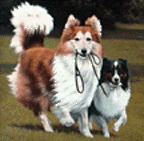 What
do we teach? What
do we teach?
We have puppy classes, obedience classes for beginners and for members
having passed Level I, Level II and Level III. We also have a section 'perros de caza' or
hunting dogs, because in the macho Spanish society many men don't consider themselves a 'manly'
unless they are a member of a hunters club . My vice-president is a past president of the
hunting association in Jalon, and thanks to him we keep in touch with those persons we want to
reach out to and try to change their behaviour. I also try to organise agility classes?
One year after I had started up in Jalon, my very good
friend from the English dog training club in Pedreguer who is called Alan Millburn, came
to see me. He asked me if he could come and train with his members on my training grounds. In
return he would bring along all the agility obstacles he had. In the course of one year I had
financed an infrastructure which was far better than what he had in Pedreguer.
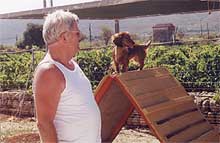 I
was very glad that I could start working again with Alan, who is fabulous with dogs.
Unfortunately this never happened. His English members don't want to socialise with 'my United
Nations', and as a result we now have an International section and an English section in the
club. I
was very glad that I could start working again with Alan, who is fabulous with dogs.
Unfortunately this never happened. His English members don't want to socialise with 'my United
Nations', and as a result we now have an International section and an English section in the
club.
Both sections are as far apart as the North and the South
Poles. When we have outings, parties or competitions they do not participate and they do train
on a Friday, while we train on Thursdays and Sundays in Jalon. They also do not want to join my
club. They want to go on as a separate group, so we never meet them.
Viva Agility classes
Having passed their obedience tests, I discovered that many of my
members were keen on starting agility, so in October last year I organised a coach trip to
Alicante where we saw a demonstration of the dog handlers competing for the Spanish
championships.
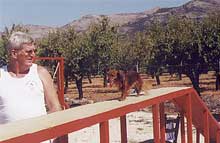 When
we came back my members were even more motivated than before. So I can see it all before me: we
will have to invest a lot of money in the infrastructure of an agility course! When
we came back my members were even more motivated than before. So I can see it all before me: we
will have to invest a lot of money in the infrastructure of an agility course!
If members from my club want to compete in agility, they
will only be allowed to do so if they belong to a club which has an agility licence. As we are
novices in the agility field, we don't have one.
My Spanish friends from StarCan, the club in Alicante
with the Flemish president (just like me), have invited me to become a member, train with them
until my dog is on Level II and then I will be given a license by the Real Sociedad Canina de
Alicante. This will then allow my members to compete wherever they want in Spain. So you
see that since the time of the Emperor Charles 5th, born in 1500 in Ghent, Flanders, the
Flemish still have a lot of influence in Spain (joke)!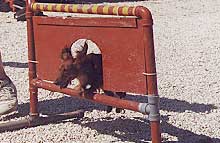
As soon as I have a dog on Level II in agility, I
will be able to obtain a licence from the Real Sociedad Canina in Alicante. The people from the
club in Alicante, as well as some members of other Spanish clubs are quite willing to help me.
While my club is a giant in size as far as the total amount of members is
concerned, the Alicante club is still limited to one language and carries on with between 10-15
members. In this area of Spain, it is still pioneering what they are doing and they are very
glad that a foreigner is willing to learn from them.
I was always feeling rather isolated because between
Valencia and Alicante, there is no other dog training club but ours. The contacts with the
other clubs are very invigorating. But also a message from someone like you is a breath of
fresh air for me.
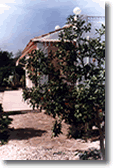 Our
dog friendly pension Our
dog friendly pension
My wife thinks that I am totally crazy as far as the dog training
club is concerned. She is absolutely right. I did not start the club as a business. I put in an
awful lot of hours, and I do not earn a penny though more and more ladies with 'difficult' dogs
are calling me for help. I charge them 6000 pesetas an hour for private lessons on a one-to-one
basis, but that does not enable us to survive. It is my wife who is making the real money with
the pension.
Being resourceful people, we decided to offer something
new in Spain - a holiday that combines comfortable accommodation, beautiful countryside and
dog training lessons. People can do agility, take a course in obedience or hunting techniques
or take great walks and excursions with their dogs. This must be unique in Spain which is not
exactly a dog loving country.
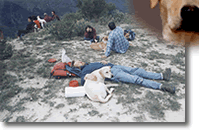 To
promote our pension, we created the website in five languages and signed a contract with a
German travel agency specialising in holidays for dog owners called 'hundeflug.de. Of
course, it would be wonderful if we could also welcome guests from the English-speaking
countries. To
promote our pension, we created the website in five languages and signed a contract with a
German travel agency specialising in holidays for dog owners called 'hundeflug.de. Of
course, it would be wonderful if we could also welcome guests from the English-speaking
countries.
Anything else you would like to know?
Oh, did I tell you that I was the Editor-in-chief of two
weekly papers? No? Okay, that's a story for next time.
For more
information, contact Bruno at
Camino Castellet 5, 03727 Jalon, Alicante, Espana
Tel./fax: (+00 34) 96 648 01 71
Mobile: (+00 34) 627 71 42 44
e-mail: b.and.b@ctv.es
Dog training club - http://www.dogs-perros.com
Bed & breakfast - http://www.pensionjalon.com
National number: 165 898
CIF: G53409074
|